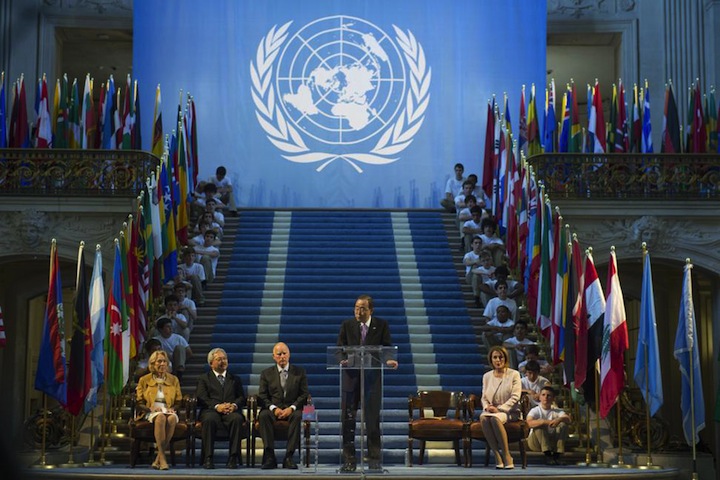“Let me thank our host country, the United States of America, for its formative role. I express my special gratitude to Governor Jerry Brown of California and Mayor Edwin Lee of San Francisco, this center of diversity and innovation. San Francisco is not just the birthplace of the United Nations; it was also where my passion to be a global citizen was born,” said Secretary-General Ban Ki-moon at a ceremony commemorating the 70th anniversary of the adoption of the Charter of the United Nations earlier today in San Francisco, California.
As Ban recollected his childhood and the help that the UN brought to South Korea, he said, “I was born just months before the United Nations. But it did not take long for it to change my world for good. When the Korean War ravaged country, I lost my home, my school, all I knew. Help came bearing the United Nations flag, sacks of grain from UNICEF, textbooks from UNESCO, and many young soldiers from 21 nations, including the United States. The United Nations showed us we were not alone.” Ban then stated what he tells all young people when he visits refugee camps around the world, “You are not alone. I made it. You can, too. The UN will stand with you. That is our mission.”
The UN Charter was signed on 26 June 1945 in San Francisco at the conclusion of the United Nations Conference on International Organization, and came into force by 24 October of that same year. Ban spoke of the delegates who, back in the 1940s, worked against the backdrop of monumental news such as Hitler’s suicide; the liberation of Dachau and the victory in Europe despite the fact that victory in San Francisco was never assured.
“Today, we take the idea of the United Nations for granted, but bringing it to life required huge leaps of statecraft to bridge differences,” Ban said. It was through intense negotiations delegates realized their dream knowing that broken societies could not simply be rebuilt with bricks and mortar, but instead with ideas and values. “With the adoption of the Charter, a world in rubble found a path to renewal. In signing the Charter, the founders achieved what many thought impossible. It falls to us to heed the Charter’s call to ‘unite our strength’ and to use their creation for the common good. The United Nations is the hope and home of all humankind and the Charter is our compass. Let us never relent on the journey to a better world for ‘we the peoples’.” Ban concluded.
An event was being concurrently held at UN Headquarters headed by Deputy Secretary-General, Jan Eliasson in New York. “Starting on a personal note,” Eliasson commented, “you may know that I always carry the Charter in my pocket. Why do I do this? In part, it is so that I can take it from my pocket at meetings for rhetorical impact, I must admit. But, most importantly, I carry it because it is a physical reminder that this is an organization built around values and principles.”
Eliasson highlighted that the Charter is a symbol of hope and aspirations that can be offered to the world despite the facts that daily work is often process-driven by timelines, agendas and programs. “We can sometimes feel the weight of the bureaucratic processes but this we can do through cooperation, dialogue, peaceful settlement of disputes and respect of human rights. As history shows, The Charter was written at the end of one of the darkest chapters in human history as the UN itself has led the charge in dismantling colonialism and bringing freedom to millions. “Everyone who comes to the UN in the hope and determination to help narrow this gap is embodying the aspirational spirit of the drafters of the Charter 70 years ago,” Eliasson added.
“We mobilized the world to defeat apartheid,” Ban added in his closing statement. “Every day, the UN feeds the hungry, shelters refugees and vaccinates children against deadly disease. Every day, we defend human rights for all, regardless of race, religion, nationality, gender or sexual orientation. These are once-in-a-generation opportunities and this is our San Francisco moment.”











